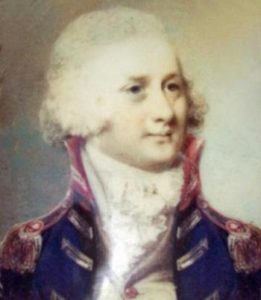
John Clarkson Jr.
*John Clarkson Jr. was born on this date in 1764. He was a white European Royal Navy officer and abolitionist.
John Clarkson was born in Wisbech. His father was headmaster of Wisbech Grammar School. After his father's death, the family lived in the town. In 1777, aged 13, he entered the Royal Navy and served primarily in the Caribbean. In 1783, he was promoted to the rank of lieutenant.
He observed firsthand the brutality and inhumanity of the slave trade. Initially unmoved by what he had witnessed, he later came to despise the institution and rendered practical assistance to the cause of abolition as the younger brother of Thomas Clarkson, one of the central figures in the abolition of slavery in England and the British Empire at the close of the 18th century.
As an agent for the Sierra Leone Company, Clarkson was instrumental in founding Freetown, today Sierra Leone's capital city, as an asylum for formerly enslaved Africans in America. He was also the first governor of the settlement. He became a pacifist in 1816. He founded the Society for the Promotion of Permanent and Universal Peace with his brother. His brother, William Wilberforce, and others had incorporated the Sierra Leone Company intending to resettle free and formerly enslaved blacks on the west coast of Africa.
Blacks in Nova Scotia were mainly formerly enslaved Africans, relocated there after the American Revolutionary War, known as Black Loyalists. They had escaped to the British and fought alongside them to secure their freedom. The British promised resettlement, land, and provisions for the first year. Despite promises from the military, the settlements were underfunded, and authorities tended to favor white Loyalists, especially those from the South. They brought enslaved people to Nova Scotia, complicating the social situation. They competed with the freedmen for land and power.
After arriving in Nova Scotia from England in October 1791, Clarkson worked with Thomas Peters and gathered a group of close to 1,200 African Nova Scotians. They wanted to leave for better opportunities in Sierra Leone. Some wanted to return home, having been kidnapped and enslaved in Africa as children. They departed in fifteen ships on January 15, 1792. After a harrowing transatlantic passage in winter, 15 boats arrived in Sierra Leone in March 1792. Clarkson remained at the settlement until returning to England at the end of December 1792.
He served as governor from August 1792 until 1793. The records of the settlers confirm Clarkson as a conscientious, supportive, reasonable, and fair administrator. His advocacy for the Africans and critique of the company resulted in his final dismissal by the business. He never returned to Freetown, but he received settlers who traveled to England to fight for their rights in the colony. They succeeded in carving out a political community and privileges for themselves.
On April 24, 1793, he married Susan Lee, the daughter of a wealthy banker. They moved to Purfleet, Essex, and he took charge of the estate of Mr. Whitbread, a local brewery. He also became the manager of Whitbread's chalk and lime quarry. The couple had ten children (six of whom died in childhood). From 1816 to 1819, he was treasurer of the Peace Society. In 1820, he left the Whitbread Company and became a banker at Woodbridge, Suffolk.
Clarkson's last words in reaction to a report of the unrelenting abuse of enslaved people in the West Indies were reported to be, "It is dreadful to think after my brother and his friends have been working for forty years; that such things should still be." John Clarkson died on April 2, 1828, in Woodbridge and was buried in the churchyard of St Mary's. Because of his work in establishing Freetown, Clarkson is one of the founding fathers of Sierra Leone, alongside Granville Sharp, Thomas Peters, and Henry Thornton. To this day, the last prayer by John Clarkson at Freetown can be found in Creoles and other Sierra Leoneans' houses. To the Nova Scotians, 'Governor Clarkson' was both 'Father' and their 'Moses' who delivered them into the promised land.